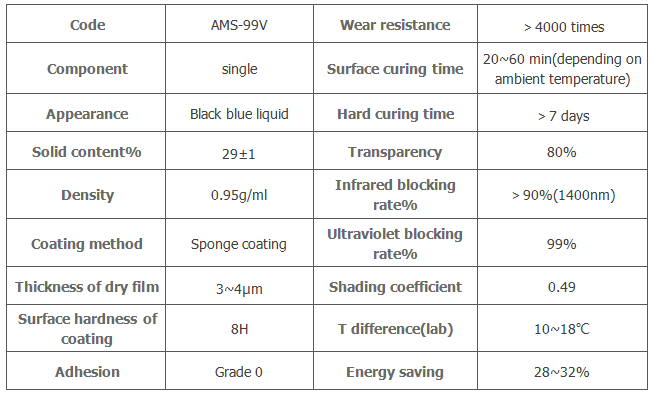Price Sheet for H9 2-4um Hi-Anti-UV, IR-Resistance, Heat-Insulation Nano Glass Wall Coating
We have probably the most state-of-the-art output equipment, experienced and qualified engineers and workers, recognized good quality manage systems plus a friendly skilled income workforce pre/after-sales support for Price Sheet for H9 2-4um Hi-Anti-UV, IR-Resistance, Heat-Insulation Nano Glass Wall Coating, In case you are intrigued in almost any of our merchandise, remember to will not hesitate to make contact with us and take the initial step to create up a prosperous enterprise romance.
We have probably the most state-of-the-art output equipment, experienced and qualified engineers and workers, recognized good quality manage systems plus a friendly skilled income workforce pre/after-sales support for China Nano Glass Coating and Glass Coating, We hope to have long-term cooperation relationships with our clients. If you are interested in any of our products, please do not hesitate to send enquiry to us/company name. We ensure that you can be totally satisfied with our best solutions!
Parameter:

Feature:
-Easy application, applied at will and freely, excellent leveling ability;
-High transparency, not affect visibility and lighting requirements, significant heat insulation and energy-saving;
-Strong weather resistance, after QUV 5000 hours testing, no change in coating, up 10 years service life;
-High surface hardness, good wear resistance, adhesion to grade 0.
Application:
Used for heat insulation and energy-saving of building glass, such as business buildings, hotels, high-end restaurants, zenith glass, residential, etc.
Used for industrial glass with requirements of infrared and ultraviolet rays shielding.
Usage:
Please read the following application process, methods and precautions, and watch application video before use. Application ambient temperature 15~40℃, humidity below 80%. No dust and other unfavorable factors.
(Ⅰ) Application Process
(Ⅱ) Application Method
Step 1: Prepare tools and materials as follows:
-Purified water: used for the preliminary cleaning of the glass surface and the purpose of using purified water is to reduce new impurities in the process of cleaning the glass.
-Cleaning agent: cleaning glass with special cleaning agent that has strong decontamination ability, acting as the first glass cleaning.
-Anhydrous ethanol: 90% industrial alcohol is required to clean the glass for the second time to remove the residual cleaning agent on the surface of the glass.
-Plastic strip and protective film: the glass frame is protected by plastic strip during construction to ensure that the contact area between the film surface and the glass frame is orderly. The protective film is attached to the bottom edge of the glass frame to avoid contamination of the wall and the ground during the coating process.
-Coating and diluent: solvent-based coatings can be divided into main materials and diluents, and the corresponding amount of diluent should be added according to the temperature of the same day in order to get better brush. When the temperature is higher than 30 ℃, diluent(5% of the weight of the main material) should be added, be sure to add the diluent into the main material and mix evenly before application.
-Measuring cup and dropper, feed plate: used for weighing diluents, and using a small amount of dropper to achieve accurate components, and finally pour into the tray.
-Non-woven paper and towels, sponge wipe: sponge wipe dipped in the appropriate amount of cleaning agent, in a spiral way to wipe the surface of glass, with a towel to wipe the remaining cleaning agent, non-woven paper is used to clean the glass surface during the second anhydrous ethanol cleaning, and wipe the tray and measuring cup with the non-woven paper at the same time each time the material is taken.
-Scraper tool: clip the nano sponge strip onto the scraper tool, then dip it into the coating and brush it.
Note: anhydrous ethanol and pure water need to be provided by customers because of inconvenient transportation.
Step 2: Clean the glass. The glass is cleaned twice with special cleaning agent and absolute ethyl alcohol.
The cleaning agent is first extruded onto the sponge, and a small amount of purified water is sprayed on the sponge, and then the sponge is wiped on the surface of the glass by the sponge dipped with the cleaning agent until the surface of the glass has no oily stain, and then the cleaning agent is removed by a clean towel; (Note: When the towel is wiped, the corner should be highlighted, because the corner is not easy to clean after the adhesive tape is attached. The erase cleaning agent can be used with a same towel, but it is not possible to use a towel that is contaminated with coating and dust). Clean the glass with anhydrous ethanol for a second time; Spray the glass with appropriate amounts of anhydrous ethanol, then wipe the glass with non-woven paper until there is no visible dust. Anhydrous ethanol can no longer touch the glass after it is wiped clean.
(Note: the corner is the most prone to residual dirt, focus on cleaning and wiping)
Step 3: border protection.
In order to avoid inadvertently touching the glass frame during the coating process, and to keep the edges of the coated glass neatly, it is necessary to use the plastic bar to cover the glass in accordance with the regulations, to ensure that the cover is intact before entering the next procedure. It is important to make sure that the joint of coating and plastic strip is neat and orderly, and that there must be one side glued to the glass when pasted, especially at the corner, so as to ensure that a line is neat and beautiful.
Step 4: Formal coating (make sure the dry glass begins to be coated after cleaning).
-Coating weighing and preparation:
Clean the tray and the measuring cup with absolute ethyl alcohol and non-woven paper.
Pour the corresponding amount coating into the measuring cup according to the standard of 20 g/ m2. When the air temperature is higher than 30℃, the diluent with the weight of 5% of the weight of the main material is required to be added into the main material and mixed. The mixing method comprises the following steps: adding the diluent into the measuring up according to a proportion, and then pouring the diluent into another measuring cup filled with a coating then shaking well.
Coating dosage formula: glass height(m) × width(m) × 20g/m2
(Note: clean the tray and measuring cup with anhydrous ethanol and non-woven paper before and after each use.)
-Formal coating. According to the construction glass area according to 20g/m2, weighing the required coating, and pour all into the feed plate; Then use a nano sponge absorbed the appropriate amount of coating, and scrape on glass surface evenly from right to left, then from the bottom up to ensure that the coating is evenly coated on the whole piece of glass. Finally, starting from one side, the film is finished from the bottom up to make sure that the film is free of bubbles, no flow marks and uniform on the surface of the glass.
(Note: The process of coating should be uniform speed, uniform strength and do not push too much; from different angles to observe more, whether there is an uneven phenomenon; After finishing, if the defect is found, the scraper tool should be used in the shortest time to swivel a few times in the defective place, then scrape it up and down twice quickly, and then re-finish it. A small number of crystal points may be observed on the surface after the coating is completed, but no need to worry that, as the crystal points will disappear within 24 hours.)
Step 5: Normal temperature curing
After 20~60 minutes (it depends on the ambient temperature), the coating surface is basically solidified. Within an hour of curing time, no object can touch the coating; Within a week, no sharp thing can touch the coating.
Step 6: Checking
After the surface of the coating is dried and solidified, remove the material such as the paper adhesive tape, the protective film, etc carefully.
Step 7: Record and fill in the form
Record ambient temperature, humidity, surface temperature and so on, do the finishing work well.
(Ⅲ) Precaution
-In the process of coating use, each take-off action should be rapid, as far as possible to reduce the contact time between the coating and air;
-Ambient temperature shall be between 15 and 40℃, and the humidity shall not be higher than 80% and there should be no water drops on the surface of the glass;
-Open flame or spark is not allowed nearby, and smoking is prohibited;
-Stored in a cool, well-ventilated place, avoid sun exposure, not close to heat, fires, power sources;
- Keep out of reach of children, and avoid contact with skin or eyes;
- In case of contact with eyes, flush with copious amount of water, call a physician.
-Not fall onto other surfaces to avoid corrosion, if contact, wipe with anhydrous ethanol as soon as possible.
*Disclaimer
The sellers, users, transportation and depositors (collectively referred to as users) of the product need to obtain an effective, the latest version of the chemical safety technology specification (MSDS) from the official channels of Shanghai Huzheng Nanotechnology Co., Ltd. and please read it carefully. It is suggested that users should receive professional training.
Packing:
Packing:500ml; 20liter/barrel.
Storage: Keep sealed below 40℃, away from the heat, fire, and power source, shelf life 6 months.










